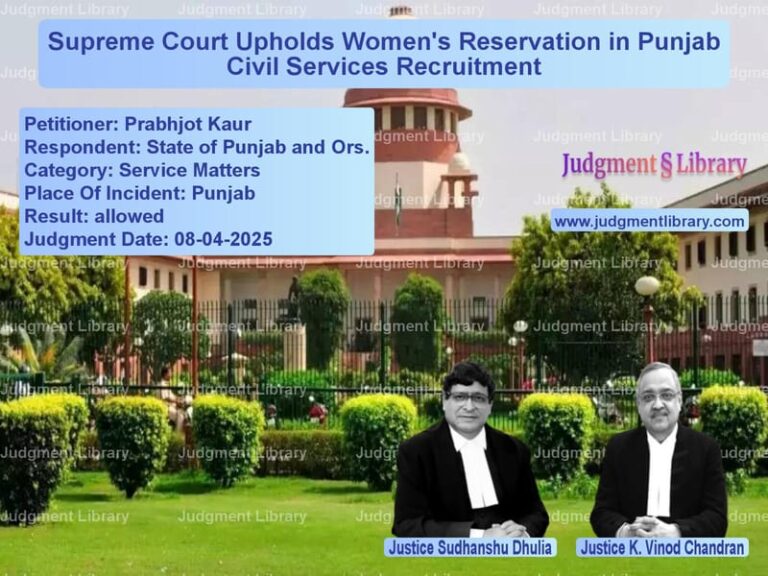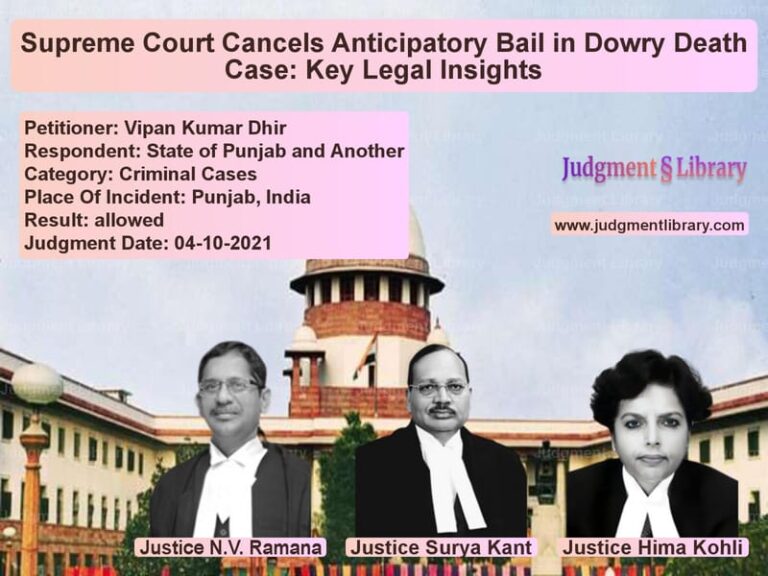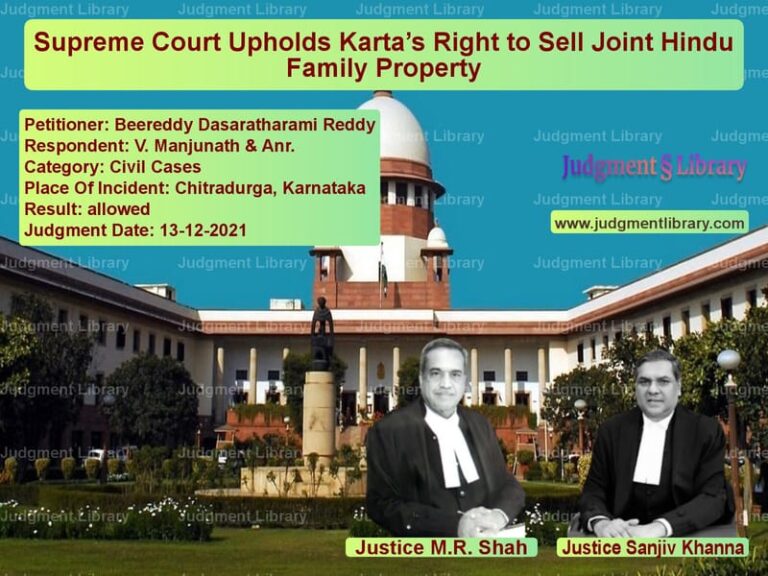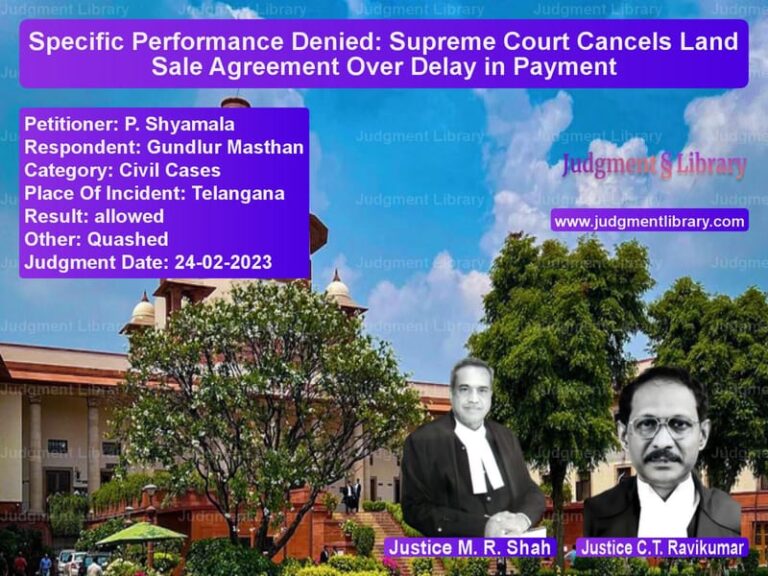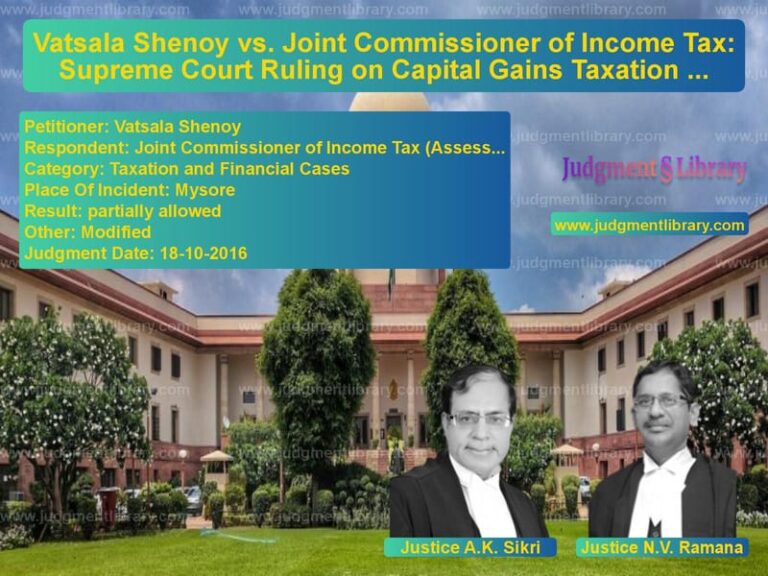Compassionate Appointment: Supreme Court Rules on Delayed Recruitment Cases
The Supreme Court of India recently delivered a crucial judgment in Malaya Nanda Sethy vs. State of Orissa and Others, where it ruled in favor of an applicant seeking compassionate appointment after prolonged delays by the state authorities. The case revolved around whether the petitioner’s claim for employment should be considered under the Odisha Civil Services (Rehabilitation Assistance) Rules, 1990 or the revised Odisha Civil Services (Rehabilitation Assistance) Rules, 2020. The Court ultimately held that since the delay in considering the petitioner’s application was caused by the authorities, he should be granted employment under the rules prevailing at the time of his father’s death.
Background of the Case
The case arose when the petitioner, Malaya Nanda Sethy, applied for a government job on compassionate grounds following the death of his father, who was serving as an Assistant Sub-Inspector in the Excise Department. His father passed away on 02 January 2010. The petitioner applied for the position of Junior Clerk under the Odisha Civil Services (Rehabilitation Assistance) Rules, 1990, in July 2010.
The key timeline of events in the case is as follows:
- In 2011, the petitioner’s application was forwarded by the Excise Commissioner to the Additional Secretary of the Excise Department.
- The file remained unattended for nearly five years.
- In 2016, the Additional Secretary requested a report on the financial condition of the petitioner’s family.
- A medical examination confirmed that the petitioner’s mother was unfit for employment.
- A report from the Tehsildar confirmed that the family’s annual income was below the prescribed threshold of Rs. 72,000.
- Despite fulfilling all criteria, the petitioner’s application was not processed.
- In 2020, the state government introduced the Odisha Civil Services (Rehabilitation Assistance) Rules, 2020, which only permitted Group D appointments.
- The authorities directed that the petitioner’s case be considered under the 2020 Rules instead of the 1990 Rules.
Key Legal Issues
- Whether the petitioner’s claim should be considered under the 1990 Rules or the 2020 Rules.
- Whether the delay caused by the authorities should affect the petitioner’s right to employment under the earlier scheme.
- The larger question of whether the scheme applicable at the time of death of the government servant or the scheme prevailing at the time of appointment should be followed.
Arguments by the Petitioner
The petitioner contended that:
- He applied under the 1990 Rules, which were in force when his father passed away.
- His application was kept pending for over a decade due to the authorities’ inaction.
- The 2020 Rules came into force only after his application was already eligible for processing.
- Since the delay was not due to his fault, he should not be penalized by being offered only a Group D post instead of the Junior Clerk post he initially applied for.
Counterarguments by the State of Orissa
The state government argued that:
- The petitioner’s claim should be considered under the 2020 Rules, as they were in force when the decision was finally made.
- A three-judge bench ruling in N.C. Santosh v. State of Karnataka (2020) had established that the rules prevailing at the time of appointment should be followed.
- Since the petitioner had not yet been appointed, the 2020 Rules should apply.
Supreme Court’s Observations
The Supreme Court acknowledged that conflicting rulings existed on whether the rules in force at the time of death or the rules in force at the time of appointment should apply. However, in this case, the Court ruled in favor of the petitioner due to the significant delays caused by the authorities.
1. The Delay Was Unreasonable and Unjustified
“There was an absolute callousness on the part of the department/authorities. The facts are conspicuous and manifest the grave delay in entertaining the application submitted by the appellant in seeking employment, which is indisputably attributable to the department/authorities.”
2. The Petitioner Had No Role in the Delay
“When there was no fault and/or delay on the part of the appellant and all throughout there was a delay on the part of the department/authorities, the appellant should not be made to suffer.”
3. Government Should Decide Cases of Compassionate Appointment Without Delay
“If the object and purpose of appointment on compassionate grounds as envisaged under the relevant policies or the rules have to be achieved, then it is just and necessary that such applications are considered well in time and not in a tardy way.”
Final Judgment
The Supreme Court ruled:
- The petitioner’s case should be considered under the 1990 Rules, as they were applicable at the time of his father’s death.
- The state government was directed to appoint the petitioner as a Junior Clerk within four weeks.
- The petitioner would be entitled to benefits only from the date of his actual appointment.
Impact of the Judgment
This ruling sets an important precedent for cases of compassionate appointment:
- Recognition of Bureaucratic Delays: The Court acknowledged that delays by the authorities should not negatively impact the applicant’s rights.
- Affirmation of Fairness in Policy Implementation: The ruling ensures that applicants are treated fairly based on the rules in force when they applied.
- Guidance for Future Cases: While the Court did not resolve the broader legal conflict regarding rule applicability, it provided a framework for cases involving long delays.
- Increased Accountability: The judgment puts pressure on government authorities to process compassionate appointment cases without unnecessary delays.
With this decision, the Supreme Court has reinforced the importance of justice in compassionate appointment cases, ensuring that applicants are not disadvantaged due to bureaucratic inefficiencies.
Petitioner Name: Malaya Nanda Sethy.Respondent Name: State of Orissa and Others.Judgment By: Justice M.R. Shah, Justice B.V. Nagarathna.Place Of Incident: Orissa.Judgment Date: 20-05-2022.
Don’t miss out on the full details! Download the complete judgment in PDF format below and gain valuable insights instantly!
Download Judgment: malaya-nanda-sethy-vs-state-of-orissa-and-supreme-court-of-india-judgment-dated-20-05-2022.pdf
Directly Download Judgment: Directly download this Judgment
See all petitions in Employment Disputes
See all petitions in Recruitment Policies
See all petitions in Public Sector Employees
See all petitions in Judgment by Mukeshkumar Rasikbhai Shah
See all petitions in Judgment by B.V. Nagarathna
See all petitions in allowed
See all petitions in supreme court of India judgments May 2022
See all petitions in 2022 judgments
See all posts in Service Matters Category
See all allowed petitions in Service Matters Category
See all Dismissed petitions in Service Matters Category
See all partially allowed petitions in Service Matters Category


